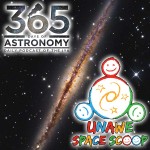Podcaster: Richard Drumm
 Title: Space Scoop: Cosmic Computer Gets An Ego Boost
Title: Space Scoop: Cosmic Computer Gets An Ego Boost
Organization: Astrosphere New Media
Link : astrosphere.org ; http://unawe.org/kids/unawe1447/
Description: Space scoop, news for children.
Bio: Richard Drumm is President of the Charlottesville Astronomical Society and President of 3D – Drumm Digital Design, a video production company with clients such as Kodak, Xerox and GlaxoSmithKline Pharmaceuticals. He was an observer with the UVa Parallax Program at McCormick Observatory in 1981 & 1982. He has found that his greatest passion in life is public outreach astronomy and he pursues it at every opportunity.
Today’s sponsor: This episode of “365 Days of Astronomy” is sponsored by — no one. We still need sponsors for many days in 2015, so please consider sponsoring a day or two. Just click on the “Donate” button on the lower left side of this webpage, or contact us at signup@365daysofastronomy.org.
Transcript:
This is 365 Days of Astronomy. Today we bring you a new episode in our Space Scoop series. This show is produced in collaboration with Universe Awareness, a program that strives to inspire every child with our wonderful cosmos.
Today’s story is…
Cosmic Computer Gets An Ego Boost
Photographs of space are just snapshots of astronomical events. To really understand how things work in the Universe we need a fuller picture.
The best way to get this fuller understanding of what we see in the universe would be to recreate the event here on Earth for closer study.
But in laboratories on Earth we don’t have the room or huge time-spans to really recreate cosmic events. The only option left to us is to use mathematics to help us create cosmic objects and events in computers, recreations called simulations.
Astronomical simulations allow us to press fast-forward or rewind on the Universe and see entire events as they unfold. Events like the formation of the Solar System, the birth of the first galaxies or the future expansion of the Universe.
To create these sorts of simulations we need extremely powerful computers called ‘supercomputers’ that can do many, many mathematical calculations per second.
One of these supercomputers, a Cray XC30 at the National Astronomical Observatory of Japan, the NAOJ, a computer called ATERUI, in September of 2014 went through computer ‘surgery’ to introduce a new ‘brain’, making it faster and smarter. Its peak performance spec is twice as many FLOPS or floating point operations per second as before.
アテルイ
Aterui is a particularly cool name, and one with a history. Aterui was the most prominent general or chief of the Isawa Emishi people of northern Japan. They were rather like Japan’s Scottsmen, fiercely independent and a bit hairy.
It took 15 years for Emperor Kammu’s shoguns to get him to surrender. Even though Shogun Sakanoue requested amnesty for him, the Emperor had Aterui executed. The disappointed shogun had him buried at a temple where the shinto priests have memorialized him annually for 1,200 years.
Wow.
There is also an asteroid, 7590 Aterui named after the fierce rebel leader.
Awesome!
ATERUI the supercomputer is now able to perform one trillion calculations per second, a teraFLOP! A trillion is a one with 12 zeros! This makes it the fastest supercomputer used for astronomy in the world.
This new and improved supercomputer is now being used by Japanese researchers and students to study an impressive variety of astronomical phenomena.
This includes the formation of planets, the inner workings of the Sun, the growth of supermassive black holes, the merger of binary neutron stars, supernova explosions of massive stars and the structure of the entire visible universe!
Here’s a Cool Fact:
The most powerful supercomputer in the world is known as TH-2. It can manage one quadrillion calculations every second – that’s a one with 15 zeros after it!
Thank you for listening to 365 Days of Astronomy!
End of podcast:
365 Days of Astronomy
=====================
The 365 Days of Astronomy Podcast is produced by NUCLIO. Audio post-production by Richard Drumm. Bandwidth donated by libsyn.com and wizzard media. You may reproduce and distribute this audio for non-commercial purposes. Please consider supporting the podcast with a few dollars (or Euros!). Visit us on the web at 365DaysOfAstronomy.org or email us at info@365DaysOfAstronomy.org. This year we celebrate cosmic light as light is our info messenger in the universe. Join us and share your story to celebrate the International Year of Light. Until tomorrow! Goodbye!

